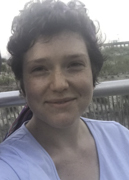Join the Center for Democratic Deliberation for a lecture by Lauren Beard, CDD Fellow and doctoral candidate in English:
Annette Vee asks rhetoric scholars to consider their role in countering the anxiety surrounding humanity’s increasing dependence on technological automation. She urges us to turn our critical attention towards code, the writing that propagates said automations, as a rhetorical process. Though on the surface code writing may seem like an arhetorical stream of letters, numbers, and characters, the decisions behind any program are made by rhetorical beings for rhetorical ends. Vee believes rhetoric scholars can conceptualize, not just how code functions in everyday life, but ways individuals can take on advocacy roles for their communities concerning how these technologies affect them, ultimately “changing [code’s] course and making it more humane” (177). My dissertation asks, what rhetorical role could bodies play in this seemingly disembodied discipline of code writing? This presentation explores the bodied intelligence exercised by two pioneers of modern programming: Ada Lovelace and Alan Turing. The centrality of embodied knowledge in their work provides essential insight into how current code writing (and the resulting technologies therein) both influence, and are influenced by, bodies. I argue that a critical understanding of bodies in code is crucial for realizing code’s past, present, and potential socio-rhetorical impacts in terms of access and social justice.


Occurrences
-
Wednesday, March 30, 2022, noon–1:30 p.m.